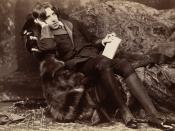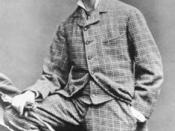English Written Task 4
* Algernon's commentary on the idle rich.
Algernon talks about the "lower" classes and their responsibility or duty to society. In Algernon's following statement, Oscar Wilde has cleverly set the character up to portray the self-righteousness of the Upper Class (to the audience) at the same time as letting him speak his mind about the lower classes. The quote from Algernon regarding classes is very early on in the play; "...Really, if the lower orders don't set us a good example, what on earth is the use of them?" (Act 1, Page 296) This implies that Algernon sees no real point in the lower classes except as a people to whom he can be superior, and therefore thinks of them as either a nuisance, or non-existent, and worries only about social matters to do with mainly himself, or higher classed individuals.
Another trait of the idle rich is extravagance.
In the tenth line of the play, Algernon says, "Why is it that at a bachelors establishment the servants invariably drink the champagne? I ask merely for information." after Lane has told him that the servants have consumed eight bottles of wine. This would seem to be quite a bit of money's worth of wine, and therefore for Algernon to not care about servants having consumed this amount, he must be very rich indeed, which is a reflection of the idle rich' arrogance in wealth and possessions.
Finally, through Algernon and his dialogue, Oscar Wilde has portrayed the idle rich to be overly self-confident, or, if you will, cocky. An example of this is in the very first and third line of the play, when Algernon says, "Did you hear what I was playing Lane?" and Lane replies "I didn't think it polite to listen, sir." Finally...


